Article Summary: Valued Tasks, Psychosis, and Wellbeing
VerifiedAdded on 2020/05/11
|7
|1625
|267
Report
AI Summary
This report summarizes a qualitative article that explored the impact of engagement in valued tasks on the wellbeing of young individuals diagnosed with psychosis. The study, conducted through semi-structured interviews and photography-elicited focus groups, identified six welfare-enhancing experiences derived from these tasks, including making meaning, expressing emotions, and cultivating skills. The report appraises the study's limitations, such as the small sample size, while also acknowledging its strengths, including the use of a combined constructivist grounded theory and narrative inquiry approach. The findings highlight the importance of identifying and supporting meaningful tasks for young people with psychosis, offering valuable insights for community mental health practice by providing a framework for understanding how valued tasks contribute to wellbeing and recovery. The report also discusses the implications for mental health services and suggests areas for future research to further explore the connection between engagement and welfare.
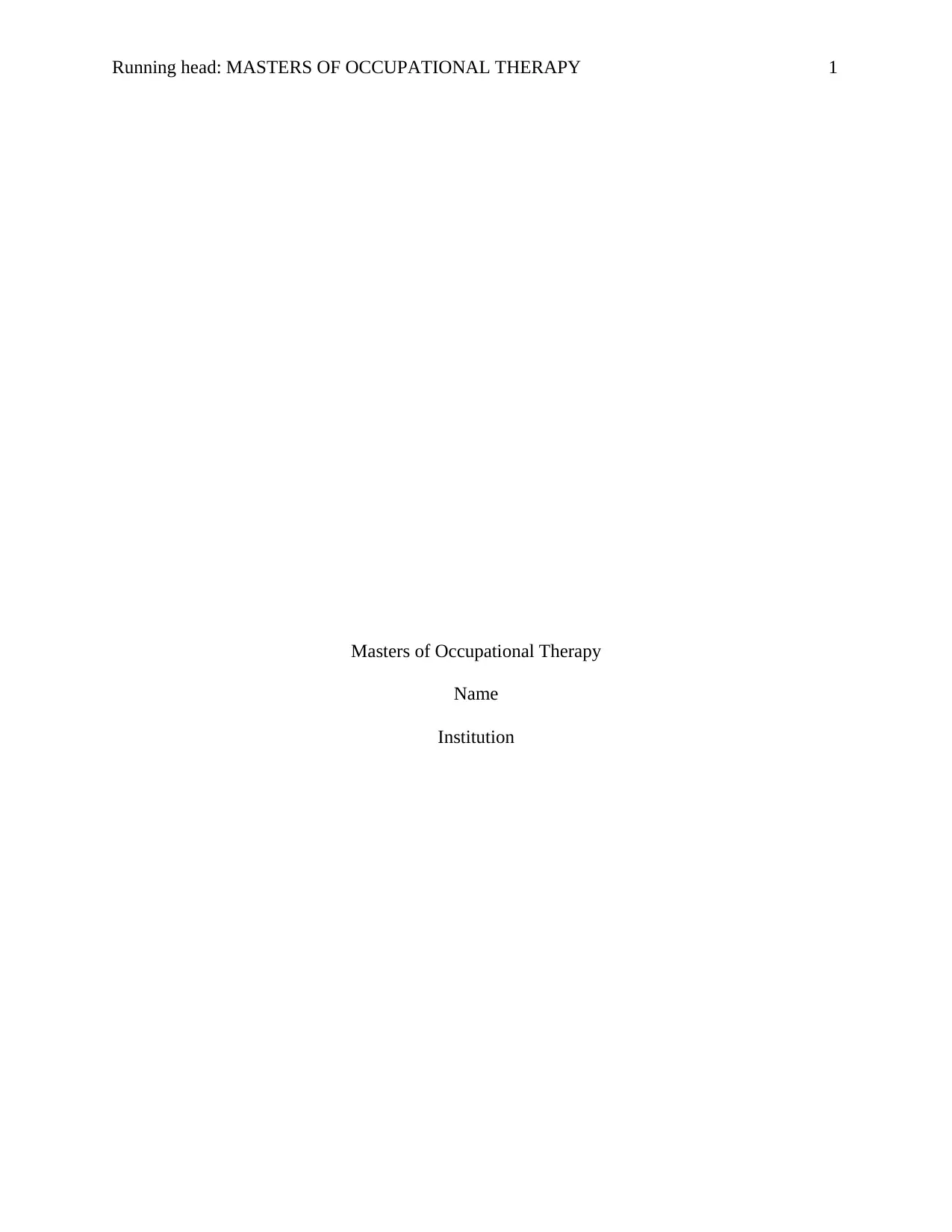
Running head: MASTERS OF OCCUPATIONAL THERAPY 1
Masters of Occupational Therapy
Name
Institution
Masters of Occupational Therapy
Name
Institution
Paraphrase This Document
Need a fresh take? Get an instant paraphrase of this document with our AI Paraphraser
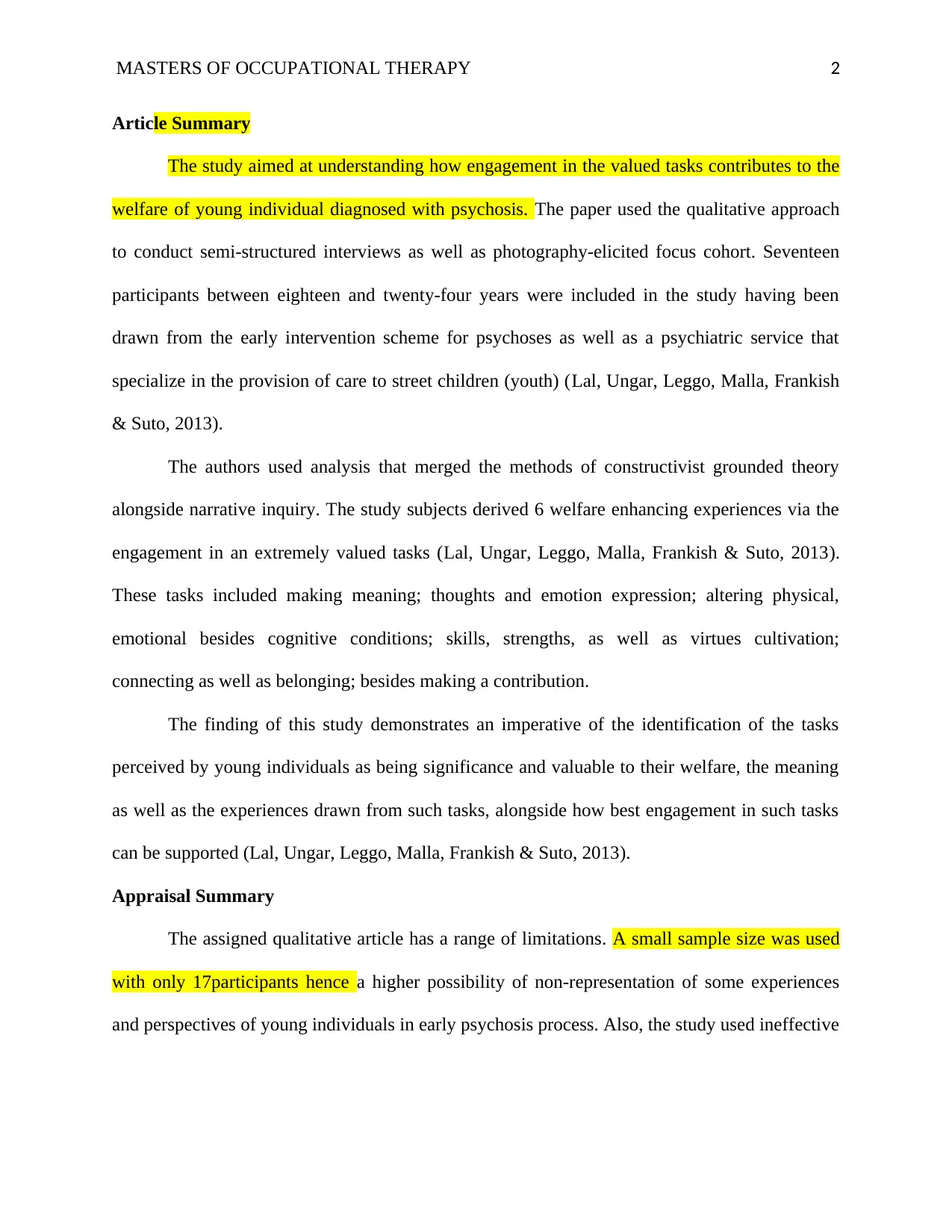
MASTERS OF OCCUPATIONAL THERAPY 2
Article Summary
The study aimed at understanding how engagement in the valued tasks contributes to the
welfare of young individual diagnosed with psychosis. The paper used the qualitative approach
to conduct semi-structured interviews as well as photography-elicited focus cohort. Seventeen
participants between eighteen and twenty-four years were included in the study having been
drawn from the early intervention scheme for psychoses as well as a psychiatric service that
specialize in the provision of care to street children (youth) (Lal, Ungar, Leggo, Malla, Frankish
& Suto, 2013).
The authors used analysis that merged the methods of constructivist grounded theory
alongside narrative inquiry. The study subjects derived 6 welfare enhancing experiences via the
engagement in an extremely valued tasks (Lal, Ungar, Leggo, Malla, Frankish & Suto, 2013).
These tasks included making meaning; thoughts and emotion expression; altering physical,
emotional besides cognitive conditions; skills, strengths, as well as virtues cultivation;
connecting as well as belonging; besides making a contribution.
The finding of this study demonstrates an imperative of the identification of the tasks
perceived by young individuals as being significance and valuable to their welfare, the meaning
as well as the experiences drawn from such tasks, alongside how best engagement in such tasks
can be supported (Lal, Ungar, Leggo, Malla, Frankish & Suto, 2013).
Appraisal Summary
The assigned qualitative article has a range of limitations. A small sample size was used
with only 17participants hence a higher possibility of non-representation of some experiences
and perspectives of young individuals in early psychosis process. Also, the study used ineffective
Article Summary
The study aimed at understanding how engagement in the valued tasks contributes to the
welfare of young individual diagnosed with psychosis. The paper used the qualitative approach
to conduct semi-structured interviews as well as photography-elicited focus cohort. Seventeen
participants between eighteen and twenty-four years were included in the study having been
drawn from the early intervention scheme for psychoses as well as a psychiatric service that
specialize in the provision of care to street children (youth) (Lal, Ungar, Leggo, Malla, Frankish
& Suto, 2013).
The authors used analysis that merged the methods of constructivist grounded theory
alongside narrative inquiry. The study subjects derived 6 welfare enhancing experiences via the
engagement in an extremely valued tasks (Lal, Ungar, Leggo, Malla, Frankish & Suto, 2013).
These tasks included making meaning; thoughts and emotion expression; altering physical,
emotional besides cognitive conditions; skills, strengths, as well as virtues cultivation;
connecting as well as belonging; besides making a contribution.
The finding of this study demonstrates an imperative of the identification of the tasks
perceived by young individuals as being significance and valuable to their welfare, the meaning
as well as the experiences drawn from such tasks, alongside how best engagement in such tasks
can be supported (Lal, Ungar, Leggo, Malla, Frankish & Suto, 2013).
Appraisal Summary
The assigned qualitative article has a range of limitations. A small sample size was used
with only 17participants hence a higher possibility of non-representation of some experiences
and perspectives of young individuals in early psychosis process. Also, the study used ineffective
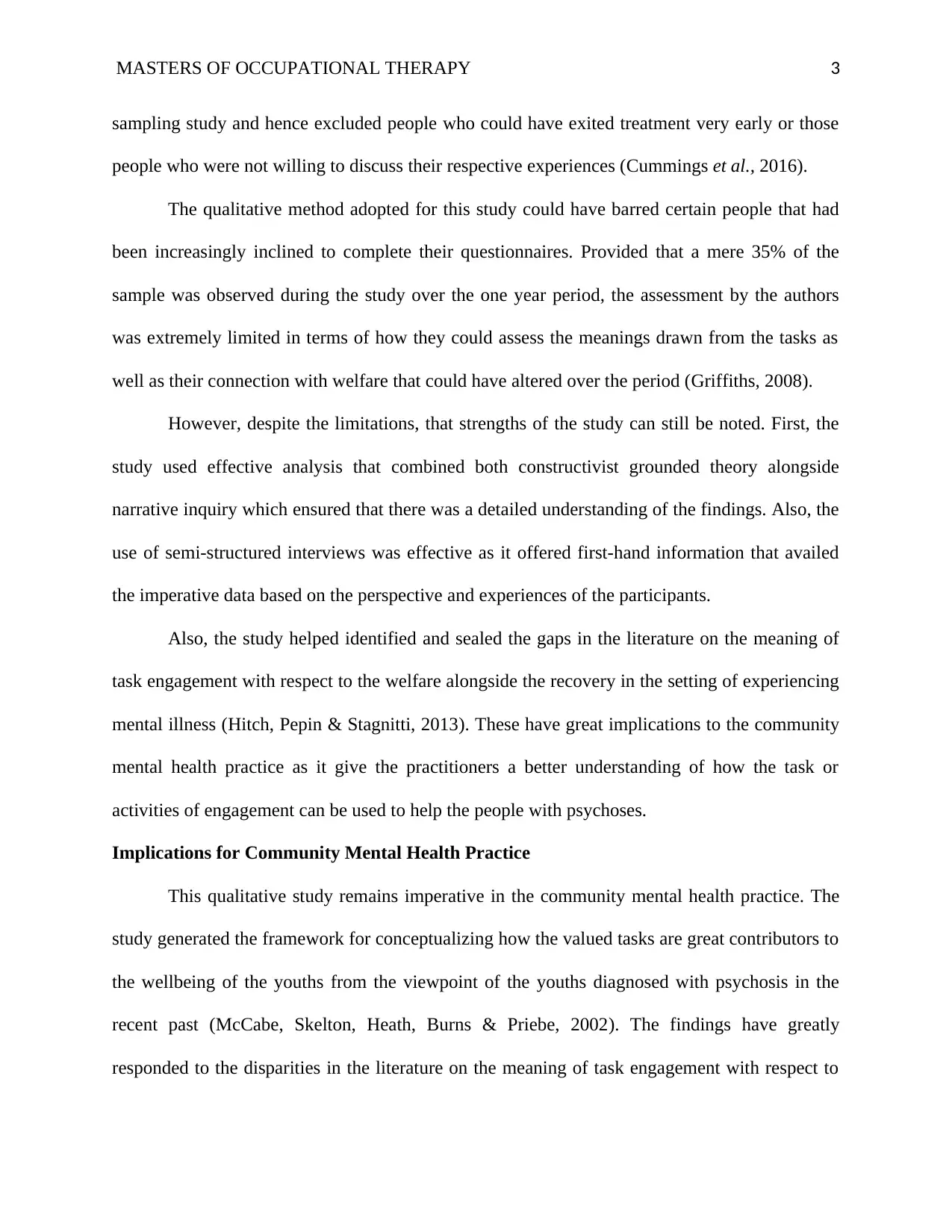
MASTERS OF OCCUPATIONAL THERAPY 3
sampling study and hence excluded people who could have exited treatment very early or those
people who were not willing to discuss their respective experiences (Cummings et al., 2016).
The qualitative method adopted for this study could have barred certain people that had
been increasingly inclined to complete their questionnaires. Provided that a mere 35% of the
sample was observed during the study over the one year period, the assessment by the authors
was extremely limited in terms of how they could assess the meanings drawn from the tasks as
well as their connection with welfare that could have altered over the period (Griffiths, 2008).
However, despite the limitations, that strengths of the study can still be noted. First, the
study used effective analysis that combined both constructivist grounded theory alongside
narrative inquiry which ensured that there was a detailed understanding of the findings. Also, the
use of semi-structured interviews was effective as it offered first-hand information that availed
the imperative data based on the perspective and experiences of the participants.
Also, the study helped identified and sealed the gaps in the literature on the meaning of
task engagement with respect to the welfare alongside the recovery in the setting of experiencing
mental illness (Hitch, Pepin & Stagnitti, 2013). These have great implications to the community
mental health practice as it give the practitioners a better understanding of how the task or
activities of engagement can be used to help the people with psychoses.
Implications for Community Mental Health Practice
This qualitative study remains imperative in the community mental health practice. The
study generated the framework for conceptualizing how the valued tasks are great contributors to
the wellbeing of the youths from the viewpoint of the youths diagnosed with psychosis in the
recent past (McCabe, Skelton, Heath, Burns & Priebe, 2002). The findings have greatly
responded to the disparities in the literature on the meaning of task engagement with respect to
sampling study and hence excluded people who could have exited treatment very early or those
people who were not willing to discuss their respective experiences (Cummings et al., 2016).
The qualitative method adopted for this study could have barred certain people that had
been increasingly inclined to complete their questionnaires. Provided that a mere 35% of the
sample was observed during the study over the one year period, the assessment by the authors
was extremely limited in terms of how they could assess the meanings drawn from the tasks as
well as their connection with welfare that could have altered over the period (Griffiths, 2008).
However, despite the limitations, that strengths of the study can still be noted. First, the
study used effective analysis that combined both constructivist grounded theory alongside
narrative inquiry which ensured that there was a detailed understanding of the findings. Also, the
use of semi-structured interviews was effective as it offered first-hand information that availed
the imperative data based on the perspective and experiences of the participants.
Also, the study helped identified and sealed the gaps in the literature on the meaning of
task engagement with respect to the welfare alongside the recovery in the setting of experiencing
mental illness (Hitch, Pepin & Stagnitti, 2013). These have great implications to the community
mental health practice as it give the practitioners a better understanding of how the task or
activities of engagement can be used to help the people with psychoses.
Implications for Community Mental Health Practice
This qualitative study remains imperative in the community mental health practice. The
study generated the framework for conceptualizing how the valued tasks are great contributors to
the wellbeing of the youths from the viewpoint of the youths diagnosed with psychosis in the
recent past (McCabe, Skelton, Heath, Burns & Priebe, 2002). The findings have greatly
responded to the disparities in the literature on the meaning of task engagement with respect to
⊘ This is a preview!⊘
Do you want full access?
Subscribe today to unlock all pages.

Trusted by 1+ million students worldwide
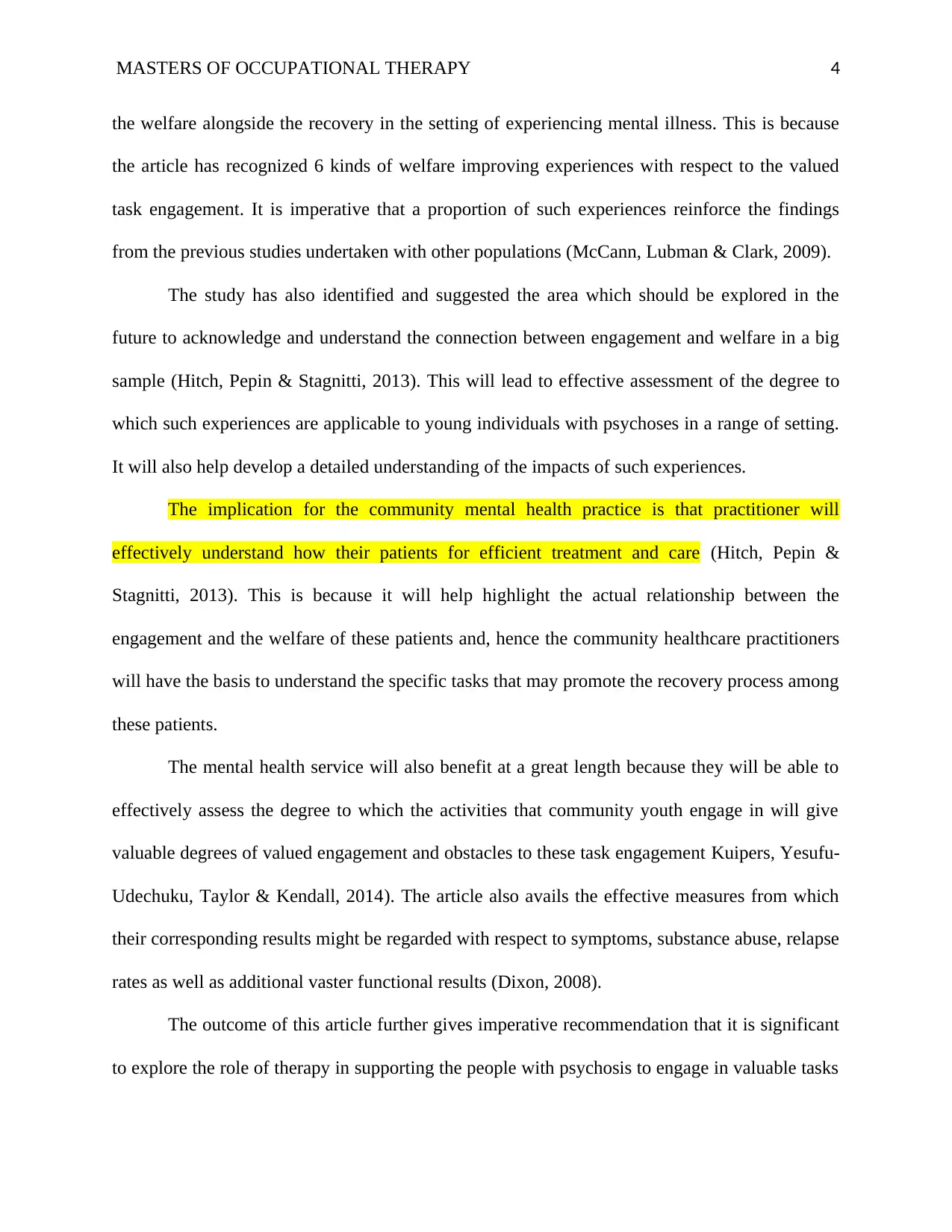
MASTERS OF OCCUPATIONAL THERAPY 4
the welfare alongside the recovery in the setting of experiencing mental illness. This is because
the article has recognized 6 kinds of welfare improving experiences with respect to the valued
task engagement. It is imperative that a proportion of such experiences reinforce the findings
from the previous studies undertaken with other populations (McCann, Lubman & Clark, 2009).
The study has also identified and suggested the area which should be explored in the
future to acknowledge and understand the connection between engagement and welfare in a big
sample (Hitch, Pepin & Stagnitti, 2013). This will lead to effective assessment of the degree to
which such experiences are applicable to young individuals with psychoses in a range of setting.
It will also help develop a detailed understanding of the impacts of such experiences.
The implication for the community mental health practice is that practitioner will
effectively understand how their patients for efficient treatment and care (Hitch, Pepin &
Stagnitti, 2013). This is because it will help highlight the actual relationship between the
engagement and the welfare of these patients and, hence the community healthcare practitioners
will have the basis to understand the specific tasks that may promote the recovery process among
these patients.
The mental health service will also benefit at a great length because they will be able to
effectively assess the degree to which the activities that community youth engage in will give
valuable degrees of valued engagement and obstacles to these task engagement Kuipers, Yesufu-
Udechuku, Taylor & Kendall, 2014). The article also avails the effective measures from which
their corresponding results might be regarded with respect to symptoms, substance abuse, relapse
rates as well as additional vaster functional results (Dixon, 2008).
The outcome of this article further gives imperative recommendation that it is significant
to explore the role of therapy in supporting the people with psychosis to engage in valuable tasks
the welfare alongside the recovery in the setting of experiencing mental illness. This is because
the article has recognized 6 kinds of welfare improving experiences with respect to the valued
task engagement. It is imperative that a proportion of such experiences reinforce the findings
from the previous studies undertaken with other populations (McCann, Lubman & Clark, 2009).
The study has also identified and suggested the area which should be explored in the
future to acknowledge and understand the connection between engagement and welfare in a big
sample (Hitch, Pepin & Stagnitti, 2013). This will lead to effective assessment of the degree to
which such experiences are applicable to young individuals with psychoses in a range of setting.
It will also help develop a detailed understanding of the impacts of such experiences.
The implication for the community mental health practice is that practitioner will
effectively understand how their patients for efficient treatment and care (Hitch, Pepin &
Stagnitti, 2013). This is because it will help highlight the actual relationship between the
engagement and the welfare of these patients and, hence the community healthcare practitioners
will have the basis to understand the specific tasks that may promote the recovery process among
these patients.
The mental health service will also benefit at a great length because they will be able to
effectively assess the degree to which the activities that community youth engage in will give
valuable degrees of valued engagement and obstacles to these task engagement Kuipers, Yesufu-
Udechuku, Taylor & Kendall, 2014). The article also avails the effective measures from which
their corresponding results might be regarded with respect to symptoms, substance abuse, relapse
rates as well as additional vaster functional results (Dixon, 2008).
The outcome of this article further gives imperative recommendation that it is significant
to explore the role of therapy in supporting the people with psychosis to engage in valuable tasks
Paraphrase This Document
Need a fresh take? Get an instant paraphrase of this document with our AI Paraphraser
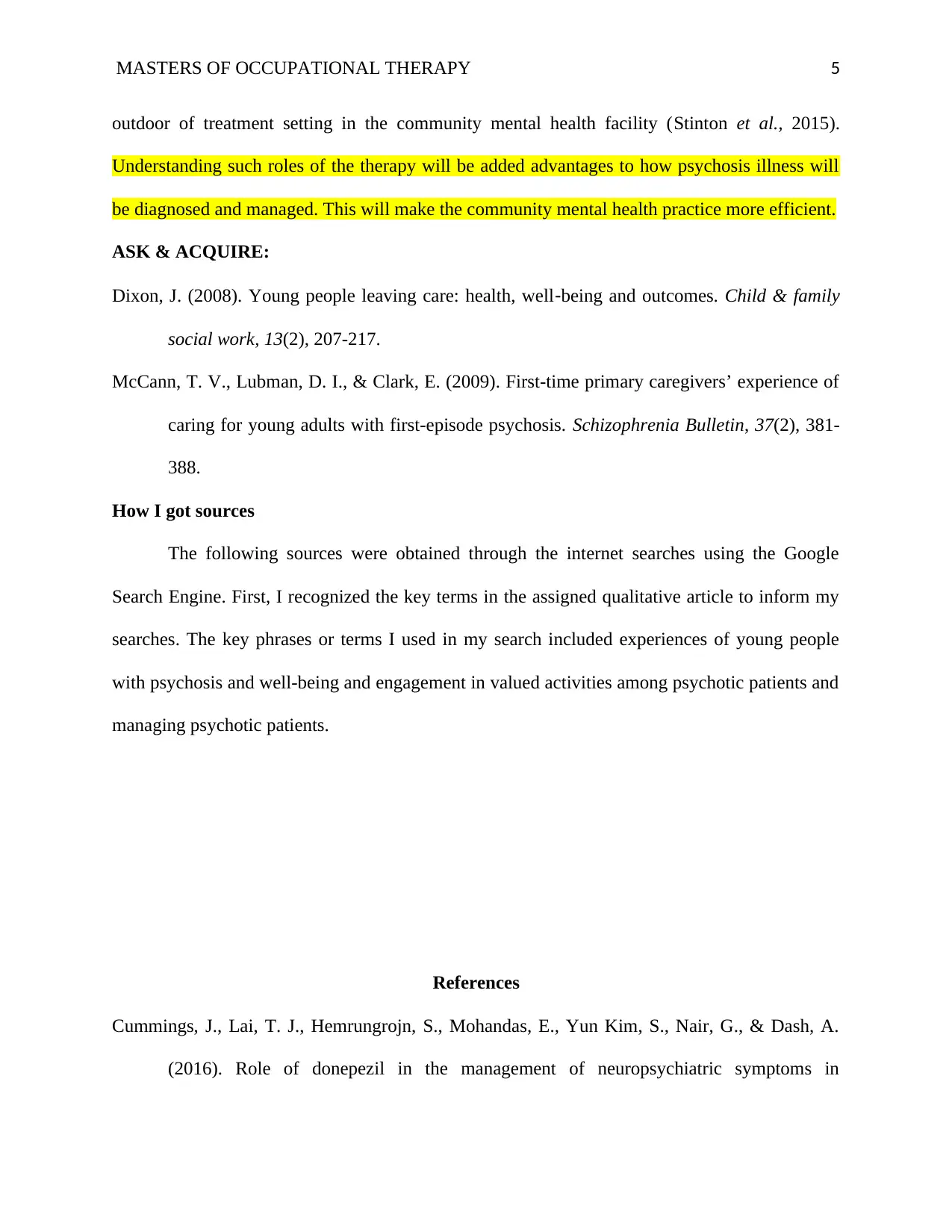
MASTERS OF OCCUPATIONAL THERAPY 5
outdoor of treatment setting in the community mental health facility (Stinton et al., 2015).
Understanding such roles of the therapy will be added advantages to how psychosis illness will
be diagnosed and managed. This will make the community mental health practice more efficient.
ASK & ACQUIRE:
Dixon, J. (2008). Young people leaving care: health, well‐being and outcomes. Child & family
social work, 13(2), 207-217.
McCann, T. V., Lubman, D. I., & Clark, E. (2009). First-time primary caregivers’ experience of
caring for young adults with first-episode psychosis. Schizophrenia Bulletin, 37(2), 381-
388.
How I got sources
The following sources were obtained through the internet searches using the Google
Search Engine. First, I recognized the key terms in the assigned qualitative article to inform my
searches. The key phrases or terms I used in my search included experiences of young people
with psychosis and well-being and engagement in valued activities among psychotic patients and
managing psychotic patients.
References
Cummings, J., Lai, T. J., Hemrungrojn, S., Mohandas, E., Yun Kim, S., Nair, G., & Dash, A.
(2016). Role of donepezil in the management of neuropsychiatric symptoms in
outdoor of treatment setting in the community mental health facility (Stinton et al., 2015).
Understanding such roles of the therapy will be added advantages to how psychosis illness will
be diagnosed and managed. This will make the community mental health practice more efficient.
ASK & ACQUIRE:
Dixon, J. (2008). Young people leaving care: health, well‐being and outcomes. Child & family
social work, 13(2), 207-217.
McCann, T. V., Lubman, D. I., & Clark, E. (2009). First-time primary caregivers’ experience of
caring for young adults with first-episode psychosis. Schizophrenia Bulletin, 37(2), 381-
388.
How I got sources
The following sources were obtained through the internet searches using the Google
Search Engine. First, I recognized the key terms in the assigned qualitative article to inform my
searches. The key phrases or terms I used in my search included experiences of young people
with psychosis and well-being and engagement in valued activities among psychotic patients and
managing psychotic patients.
References
Cummings, J., Lai, T. J., Hemrungrojn, S., Mohandas, E., Yun Kim, S., Nair, G., & Dash, A.
(2016). Role of donepezil in the management of neuropsychiatric symptoms in
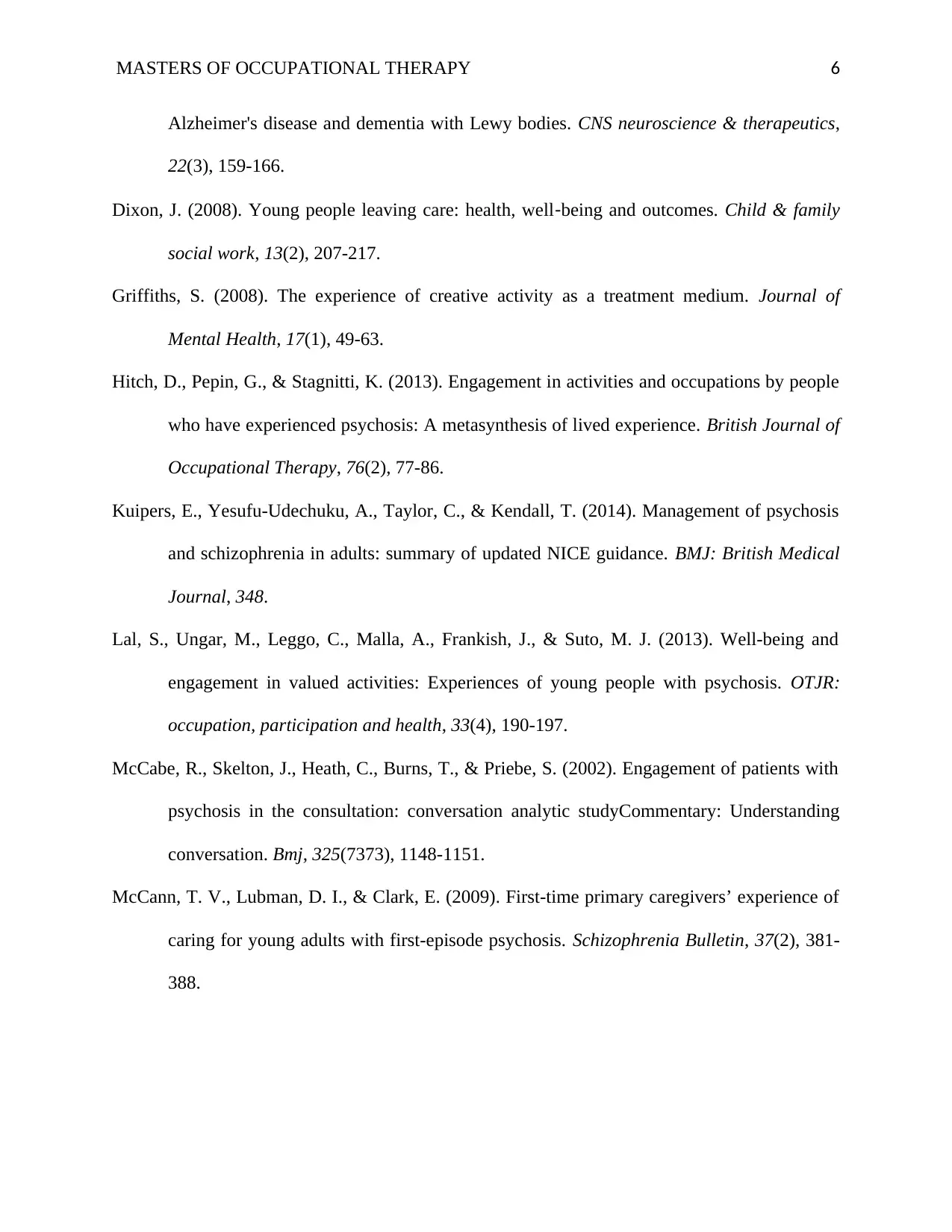
MASTERS OF OCCUPATIONAL THERAPY 6
Alzheimer's disease and dementia with Lewy bodies. CNS neuroscience & therapeutics,
22(3), 159-166.
Dixon, J. (2008). Young people leaving care: health, well‐being and outcomes. Child & family
social work, 13(2), 207-217.
Griffiths, S. (2008). The experience of creative activity as a treatment medium. Journal of
Mental Health, 17(1), 49-63.
Hitch, D., Pepin, G., & Stagnitti, K. (2013). Engagement in activities and occupations by people
who have experienced psychosis: A metasynthesis of lived experience. British Journal of
Occupational Therapy, 76(2), 77-86.
Kuipers, E., Yesufu-Udechuku, A., Taylor, C., & Kendall, T. (2014). Management of psychosis
and schizophrenia in adults: summary of updated NICE guidance. BMJ: British Medical
Journal, 348.
Lal, S., Ungar, M., Leggo, C., Malla, A., Frankish, J., & Suto, M. J. (2013). Well-being and
engagement in valued activities: Experiences of young people with psychosis. OTJR:
occupation, participation and health, 33(4), 190-197.
McCabe, R., Skelton, J., Heath, C., Burns, T., & Priebe, S. (2002). Engagement of patients with
psychosis in the consultation: conversation analytic studyCommentary: Understanding
conversation. Bmj, 325(7373), 1148-1151.
McCann, T. V., Lubman, D. I., & Clark, E. (2009). First-time primary caregivers’ experience of
caring for young adults with first-episode psychosis. Schizophrenia Bulletin, 37(2), 381-
388.
Alzheimer's disease and dementia with Lewy bodies. CNS neuroscience & therapeutics,
22(3), 159-166.
Dixon, J. (2008). Young people leaving care: health, well‐being and outcomes. Child & family
social work, 13(2), 207-217.
Griffiths, S. (2008). The experience of creative activity as a treatment medium. Journal of
Mental Health, 17(1), 49-63.
Hitch, D., Pepin, G., & Stagnitti, K. (2013). Engagement in activities and occupations by people
who have experienced psychosis: A metasynthesis of lived experience. British Journal of
Occupational Therapy, 76(2), 77-86.
Kuipers, E., Yesufu-Udechuku, A., Taylor, C., & Kendall, T. (2014). Management of psychosis
and schizophrenia in adults: summary of updated NICE guidance. BMJ: British Medical
Journal, 348.
Lal, S., Ungar, M., Leggo, C., Malla, A., Frankish, J., & Suto, M. J. (2013). Well-being and
engagement in valued activities: Experiences of young people with psychosis. OTJR:
occupation, participation and health, 33(4), 190-197.
McCabe, R., Skelton, J., Heath, C., Burns, T., & Priebe, S. (2002). Engagement of patients with
psychosis in the consultation: conversation analytic studyCommentary: Understanding
conversation. Bmj, 325(7373), 1148-1151.
McCann, T. V., Lubman, D. I., & Clark, E. (2009). First-time primary caregivers’ experience of
caring for young adults with first-episode psychosis. Schizophrenia Bulletin, 37(2), 381-
388.
⊘ This is a preview!⊘
Do you want full access?
Subscribe today to unlock all pages.

Trusted by 1+ million students worldwide

MASTERS OF OCCUPATIONAL THERAPY 7
Stinton, C., McKeith, I., Taylor, J. P., Lafortune, L., Mioshi, E., Mak, E., ... & O’Brien, J. T.
(2015). Pharmacological management of Lewy body dementia: a systematic review and
meta-analysis. American Journal of Psychiatry, 172(8), 731-742.
Stinton, C., McKeith, I., Taylor, J. P., Lafortune, L., Mioshi, E., Mak, E., ... & O’Brien, J. T.
(2015). Pharmacological management of Lewy body dementia: a systematic review and
meta-analysis. American Journal of Psychiatry, 172(8), 731-742.
1 out of 7
Your All-in-One AI-Powered Toolkit for Academic Success.
+13062052269
info@desklib.com
Available 24*7 on WhatsApp / Email
![[object Object]](/_next/static/media/star-bottom.7253800d.svg)
Unlock your academic potential
Copyright © 2020–2025 A2Z Services. All Rights Reserved. Developed and managed by ZUCOL.